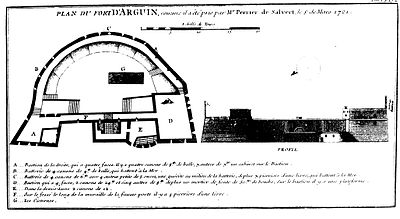| Revision as of 11:13, 8 June 2015 editRicky81682 (talk | contribs)Extended confirmed users161,010 edits + 13 categories using HotCat← Previous edit |
Revision as of 17:14, 17 October 2016 edit undoInternetArchiveBot (talk | contribs)Bots, Pending changes reviewers5,382,172 edits Rescuing 1 sources and tagging 0 as dead. #IABot (v1.2.5)Next edit → |
| Line 5: |
Line 5: |
|
== History == |
|
== History == |
|
|
|
|
|
The island changed hands frequently during the ]. The first ]an to visit the island was the ] explorer ], in 1443.<ref name="Lander's Travels">Huish, John. ''Travels of Richard and John Lander into the interior of Africa.'' </ref> In 1445, Prince ] set up a trading post on the island, which acquired ] and ]. By 1455, 800 slaves were shipped from Arguin to ] every year.<ref name="AntiSlavery.org Portugal"></ref> |
|
The island changed hands frequently during the ]. The first ]an to visit the island was the ] explorer ], in 1443.<ref name="Lander's Travels">Huish, John. ''Travels of Richard and John Lander into the interior of Africa.'' </ref> In 1445, Prince ] set up a trading post on the island, which acquired ] and ]. By 1455, 800 slaves were shipped from Arguin to ] every year.<ref name="AntiSlavery.org Portugal"> {{wayback|url=http://old.antislavery.org/breakingthesilence/slave_routes/slave_routes_portugal.shtml |date=20131110230050 }}</ref> |
|
|
|
|
|
In 1633, during its ] (which then ]), the ] seized control of Arguin. It remained under Dutch rule until 1678, with a brief interruption by ] rule in 1665. ] took over the island in September 1678, but it was then abandoned until 1685.<ref name="Sovereignty Timeline"></ref> Arguin's aridity and its lack of a good anchorage made long-term European settlement difficult.<ref name="1911 Britannica" /> |
|
In 1633, during its ] (which then ]), the ] seized control of Arguin. It remained under Dutch rule until 1678, with a brief interruption by ] rule in 1665. ] took over the island in September 1678, but it was then abandoned until 1685.<ref name="Sovereignty Timeline"></ref> Arguin's aridity and its lack of a good anchorage made long-term European settlement difficult.<ref name="1911 Britannica" /> |
In 1685 Captain Reers of the frigate "Rother Löwe" occupied the old Portuguese fort on the island. He successfully concluded a treaty with the native king in which Brandenburg was accepted as a protecting power. The treaty was ratified in 1687 and was renewed in 1698. Arguin remained a colony of Brandenburg until 1721 when the French successfully assaulted the fort and then took control of the island. The Dutch took the fort and island from the French the following year only to lose it again in 1724 to the French. This period of French rule lasted four years; in 1728, it reverted to the control of indigenous peoples. The island was included in the territory of the French colony of Mauritania, and it remained under Mauritanian rule when that country became independent in 1960.


